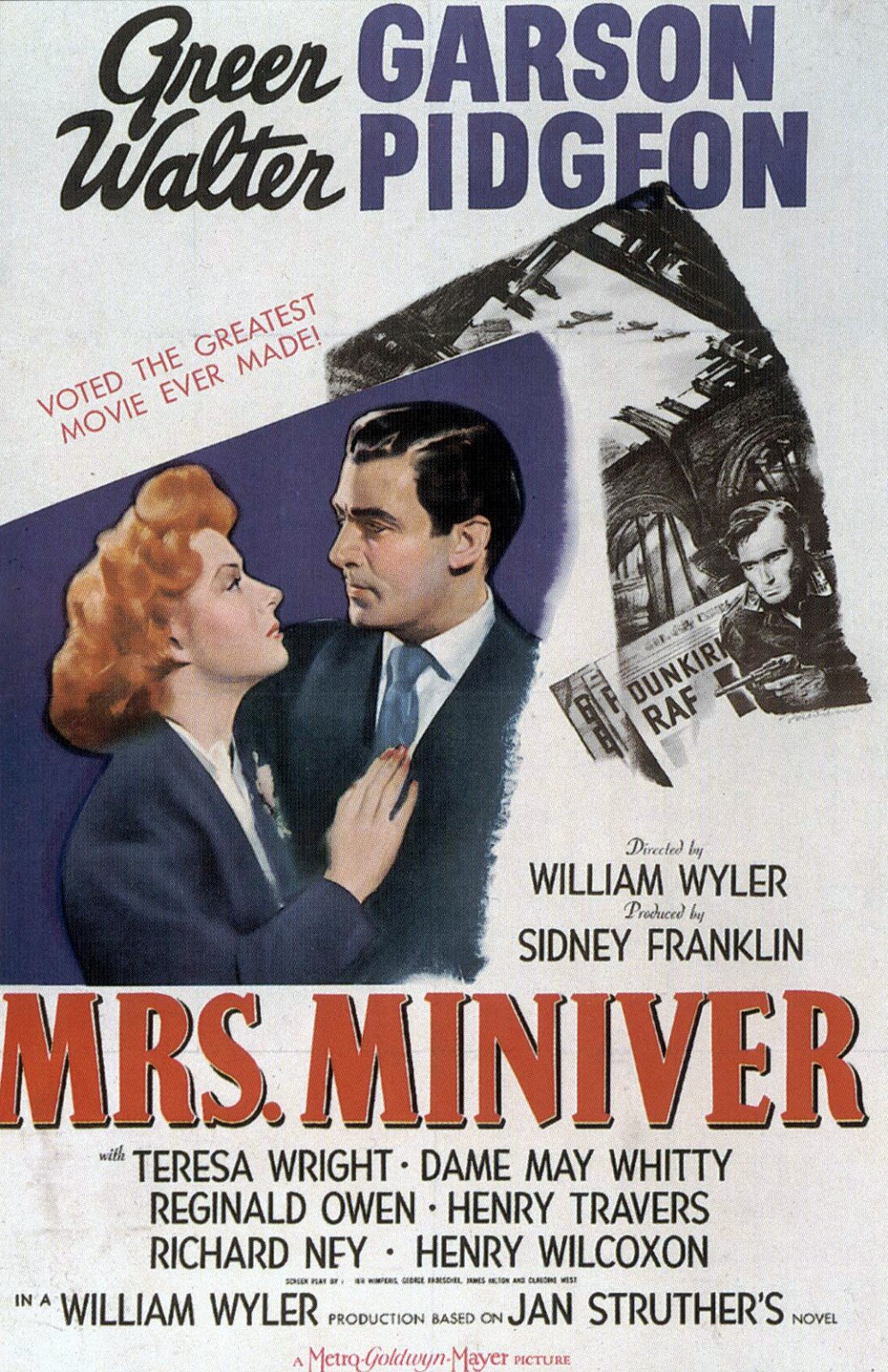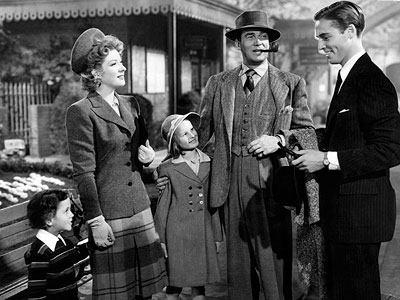 In consideration of what to say about this week’s film, my
initial reaction is pledged to indifference. As far as films go, “Mrs. Miniver”
is a fine entry. I would even say I enjoyed watching it. But I wouldn’t say I
loved it, nor would I venture into the vicinity of saying anything close to it.
When the final credits rolled, I found that nothing about “Mrs. Miniver” struck
me as particularly interesting or even compelling. For the most part, the film
felt forgettable and had faded from my mind by the end of the evening. As far
as cinematic experiences are concerned, I think having an apathetic response to
a film is perhaps the worst kind. At least a terrible film can elicit a clear
and concentrated reaction that generates something to be said around the dinner
table.
In consideration of what to say about this week’s film, my
initial reaction is pledged to indifference. As far as films go, “Mrs. Miniver”
is a fine entry. I would even say I enjoyed watching it. But I wouldn’t say I
loved it, nor would I venture into the vicinity of saying anything close to it.
When the final credits rolled, I found that nothing about “Mrs. Miniver” struck
me as particularly interesting or even compelling. For the most part, the film
felt forgettable and had faded from my mind by the end of the evening. As far
as cinematic experiences are concerned, I think having an apathetic response to
a film is perhaps the worst kind. At least a terrible film can elicit a clear
and concentrated reaction that generates something to be said around the dinner
table.
Directed by the legendary William Wyler, “Mrs. Miniver”
garnered 12 Oscar nominations, carting off half that number, including Best
Picture for 1943. The picture stars Greer Garson and Walter Pidgeon, as a
middle-class English couple living an idyllic life in a small village just
beyond London. The announcement of Britain’s entry into World War II quickly
props up a new backdrop against which the Minivers encounter a host of distressing
scenarios from assisting with the evacuation of Dunkirk to the death of their
new daughter-in-law. Yet through it all, the Minivers remain steadfast and
stalwart, refusing to let war force them into renouncing their courage and love
for fear and bitterness.
I think one explanation accounting for why I found “Mrs.
Miniver” to be principally forgettable is that none of the characters stand out
as remarkable, which is disappointing as I’m a fan of both Greer Garson and
Walter Pidgeon. There is no character development throughout the course of the
story. All of the principle players are nice, good-natured and sweet to each
other. Everyone seemingly maintains all of the same qualities intact by the end
of the film that were present at the beginning of the film, without any
alterations, despite having endured all that they did. I refuse to accept that
an individual’s character wouldn’t undergo some sort of revision with the
precarious spirit of World War II literally making its way to their front
porch.
 |
| The Minivers in happier times. |
The only snaps I can really think to submit on this film’s
behalf is that it adds a different angle to the canon of war films by offering
up a portrait of civilian life. Unlike the majority of war films, “Mrs.
Miniver” doesn’t transport the viewer to the front lines of battle. Instead, it
maintains a domestic perspective, attempting to showcase the effects of the
battlefield, as it rattles everyday living. Suddenly material possessions like
cars and lady’s hats fade in value, as the Minivers are confronted by the
perils of war, causing them to strip away superficial priorities. But here
again, the film never dives to any great depth to illustrate the struggle of
readjusting civilian reality to the more aggressive existence of war. I suppose
this problem can be traced back to the issue of the characters not being
presented in a complex or dimensional way.
 |
| The Minivers take safety in their bomb shelter. |
In truth, “Mrs. Miniver” works more as a piece of propaganda
than as a piece of entertainment. Propaganda is a form of communication that
seeks to influence opinion, doing away with impartiality and letting the
audience decide. When impartiality is eliminated, it anchors the narrative to
remain in more simplistic waters. That essentially sums up “Mrs. Miniver,”
which sought to be a ray of hope that would elicit sympathy and support for the
struggle of the ordinary, everyday British citizen against the onslaught of
Nazi attacks. From that perspective, the film plays on a much more interesting
note. Of its effectiveness, Winston Churchill is said to have remarked that
“Mrs. Miniver” is “propaganda worth 100 battleships.” Taken in that context,
it’s no wonder that it was a box office behemoth of the 1940s that affected the
attitudes of millions. But like all propaganda, “Mrs. Miniver” was created to
exist for a specific cause now passed, making it feel dated and somewhat
difficult to appreciate its power because the times are remarkably different
now.
 Favorite Line: The
finale of “Mrs. Miniver” is staged in the local church, now ravaged and
fragmented by war, where the local vicar makes an impassioned speech to his
small parish, imploring them to take up the cause to fight for freedom against
those that would impose tyranny. Apparently, this speech made such an impact
the President Franklin Roosevelt requested the text to be broadcast over the
Voice of America in Europe and to be printed on millions of leaflets dropped
over German-occupied territory. It has often been cited as an example of the
type of Hollywood filmmaking that helped mobilized America to war in defense of
its allies. The text of the speech is printed below:
Favorite Line: The
finale of “Mrs. Miniver” is staged in the local church, now ravaged and
fragmented by war, where the local vicar makes an impassioned speech to his
small parish, imploring them to take up the cause to fight for freedom against
those that would impose tyranny. Apparently, this speech made such an impact
the President Franklin Roosevelt requested the text to be broadcast over the
Voice of America in Europe and to be printed on millions of leaflets dropped
over German-occupied territory. It has often been cited as an example of the
type of Hollywood filmmaking that helped mobilized America to war in defense of
its allies. The text of the speech is printed below:
We, in this quiet
corner of England, have suffered the loss of friends very dear to us-- some
close to this church: George West, choir boy; James Bellard, station master and
bell ringer and a proud winner, only one hour before his death, of the Belding
Cup for his beautiful Miniver rose; and our hearts go out in sympathy to the
two families who share the cruel loss of a young girl who was married at this
altar only two weeks ago.
The homes of many of
us have been destroyed, and the lives of young and old have been taken. There
is scarcely a household that hasn't been struck to the heart.
And why? Surely you
must have asked yourself this question. Why in all conscience should these be
the ones to suffer? Children, old people, a young girl at the height of her
loveliness. Why these? Are these our soldiers? Are these our fighters? Why
should they be sacrificed?
I shall tell you why.
Because this is not
only a war of soldiers in uniform. It is a war of the people, of all the
people, and it must be fought not only on the battlefield, but in the cities
and in the villages, in the factories and on the farms, in the home, and in the
heart of every man, woman, and child who loves freedom!
Well, we have buried
our dead, but we shall not forget them. Instead they will inspire us with an
unbreakable determination to free ourselves and those who come after us from
the tyranny and terror that threaten to strike us down. This is the people's
war! It is our war! We are the fighters! Fight it then! Fight it with all that
is in us, and may God defend the right.














